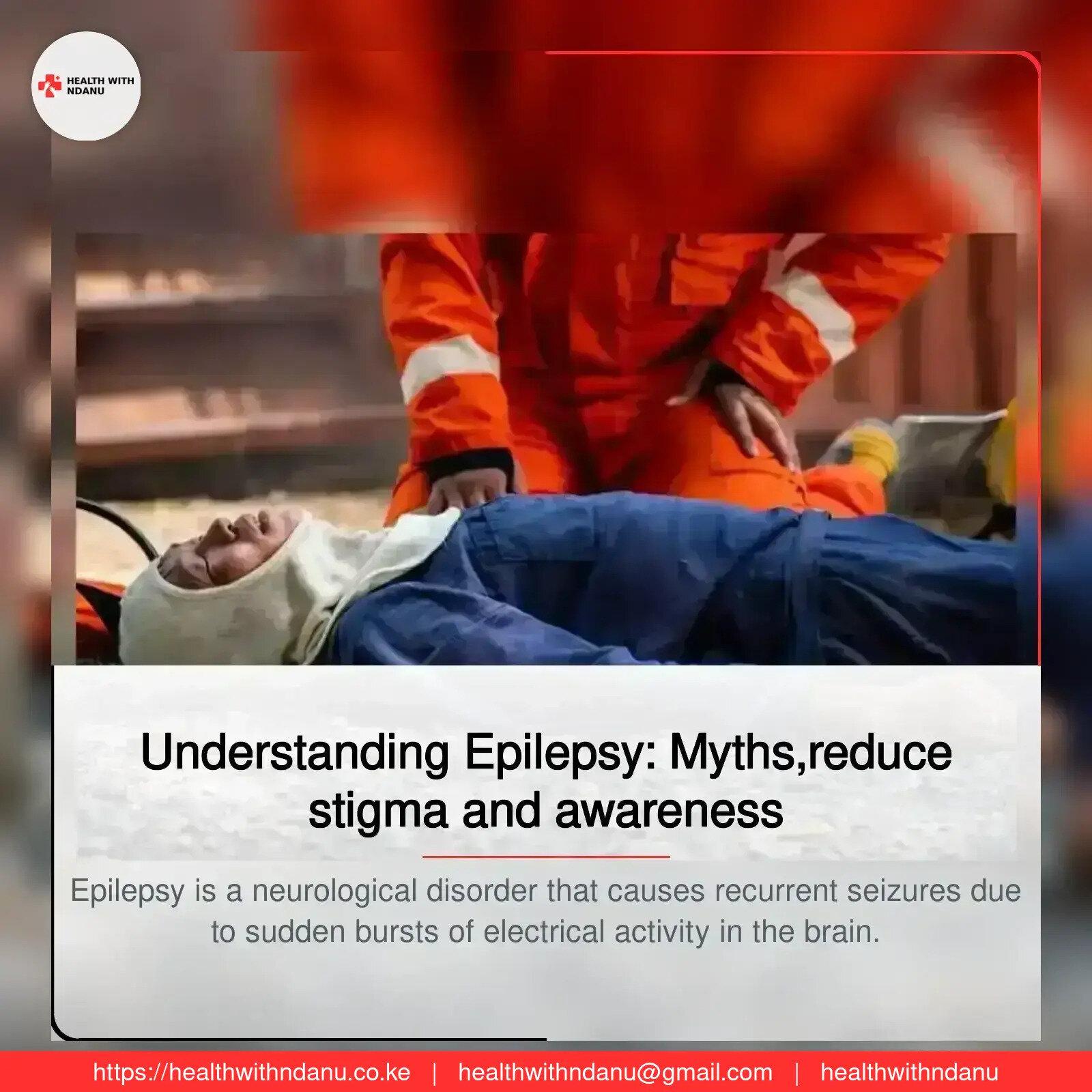Understanding Epilepsy: Myths,reduce stigma and awareness
- by Diana Ndanu
- 07 February, 2025
- 0 Comments
- 6 Mins



What is Epilepsy?
Epilepsy is a neurological disorder that causes recurrent seizures due to sudden bursts of electrical activity in the brain. It affects over 50 million people worldwide, making it one of the most common brain conditions. Despite its prevalence, misconceptions and stigma continue to surround epilepsy, leading to fear, discrimination, and misinformation.
This article aims to educate the public about epilepsy, debunk common myths, and encourage compassion and understanding for those living with the condition.
What Causes Epilepsy?
Epilepsy can develop at any age and can be caused by various factors, including:
🔹 Genetic Factors – Some types of epilepsy run in families, suggesting a genetic link.
🔹 Brain Injuries – Head trauma from accidents, sports injuries, or falls can trigger epilepsy.
🔹 Stroke and Brain Tumors – These conditions can damage brain cells and lead to seizures.
🔹 Infections – Diseases like meningitis, encephalitis, or neurocysticercosis can cause epilepsy.
🔹 Developmental Disorders – Autism, cerebral palsy, and other neurological conditions increase the risk.
🔹 Unknown Causes – In many cases, doctors cannot pinpoint the exact cause (this is called idiopathic epilepsy).
Understanding the cause of epilepsy can help improve treatments and reduce stigma.
Types of Seizures: Not All Look the Same
One of the biggest misconceptions about epilepsy is that all seizures involve shaking and convulsions. In reality, epilepsy presents in many different ways.
1. Generalized Seizures (Affecting the Whole Brain)
✅ Tonic-Clonic Seizures (Grand Mal Seizures) – The classic seizure involving stiffening, shaking, loss of consciousness, and confusion afterward.
✅ Absence Seizures (Petit Mal Seizures) – Brief episodes of staring, blinking, or slight head movements, often mistaken for daydreaming.
✅ Myoclonic Seizures – Quick, shock-like jerks in the muscles, usually in the arms or legs.
✅ Atonic Seizures – Sudden loss of muscle tone, causing a person to collapse.
2. Focal Seizures (Affecting Only Part of the Brain)
✅ Focal Aware Seizures (Simple Partial Seizures) – A person remains aware but may experience unusual sensations like tingling, flashing lights, or strange smells.
✅ Focal Impaired Awareness Seizures (Complex Partial Seizures) – A person appears confused, unresponsive, or may perform repetitive movements like lip-smacking or hand-rubbing.
Why This Matters: Many people don’t recognize seizures because they don’t always involve convulsions. Awareness can help people respond appropriately.
Common Myths About Epilepsy (and the Truth!)
Myth #1: Epilepsy is Contagious
🚫 Fact: Epilepsy is a brain disorder, not an infection. You cannot catch epilepsy from someone else.
Myth #2: People with Epilepsy Cannot Live Normal Lives
🚫 Fact: Many people with epilepsy lead successful careers and normal lives. Famous figures like actor Danny Glover and musician Prince had epilepsy.
Myth #3: All Seizures Involve Convulsions
🚫 Fact: Some seizures are subtle—such as blank staring, muscle twitches, or brief confusion—and may go unnoticed.
Myth #4: A Person Having a Seizure Should Be Restrained or Given a Spoon
🚫 Fact: You should never hold a person down or put anything in their mouth. Instead, place them on their side and protect them from injury.
Myth #5: Epilepsy is Caused by Demons, Curses, or the Supernatural
🚫 Fact: Epilepsy is a medical condition caused by electrical activity in the brain—not by supernatural forces.
Dispelling these myths can help reduce fear and discrimination against people with epilepsy.
How is Epilepsy Diagnosed?
Doctors diagnose epilepsy using a combination of:
✔️ Medical History – Understanding past seizures, symptoms, and family history.
✔️ EEG (Electroencephalogram) – A test that records brain waves to detect abnormal activity.
✔️ MRI or CT Scans – Imaging tests to check for brain abnormalities like tumors or injuries.
✔️ Blood Tests – To rule out infections or metabolic disorders.
Early diagnosis and treatment can significantly improve a person’s quality of life.
Epilepsy Treatments: Can It Be Cured?
There is no cure for epilepsy yet, but treatment can help control seizures. Options include:
1. Anti-Seizure Medications (ASMs)
Most people with epilepsy manage their condition with daily medication. Common drugs include:
✔️ Valproate
✔️ Levetiracetam (Keppra)
✔️ Carbamazepine
✔️ Lamotrigine
2. Surgery
For people with drug-resistant epilepsy, brain surgery may help remove the area causing seizures.
3. Dietary Therapy
The ketogenic diet (high fat, low carb) helps some children reduce seizures.
4. Vagus Nerve Stimulation (VNS)
A small device implanted in the chest sends signals to the brain to reduce seizures.
Proper treatment can help 70% of people with epilepsy live seizure-free lives.
First Aid for Seizures: What to Do (and What NOT to Do)
DO:
✅ Stay calm and reassure others.
✅ Move the person to a safe space away from hazards.
✅ Turn them on their side to keep the airway clear.
✅ Place something soft under their head to prevent injury.
✅ Stay with them until they are fully alert.
DON’T:
❌ Do NOT put anything in their mouth (they won’t swallow their tongue!).
❌ Do NOT hold them down or try to stop movements.
❌ Do NOT give food or water until they’re fully awake.
Knowing seizure first aid can save a life!
How Society Can Help End Epilepsy Stigma
💜 1. Educate Others – Share facts and debunk myths.
💜 2. Support People with Epilepsy – Show kindness and understanding.
💜 3. Advocate for Epilepsy Research – Support funding for new treatments.
💜 4. Encourage Workplace and School Inclusion – People with epilepsy deserve equal opportunities.
💜 5. Participate in Epilepsy Awareness Events – Wear purple on Purple Day (March 26th) to show support!
Epilepsy does not define a person—understanding and acceptance do.
🔚 Final Thoughts
Epilepsy is a medical condition, not a curse, punishment, or reason for discrimination. With the right support, education, and treatment, people with epilepsy can live full, productive lives.
Let’s work together to spread awareness, stop the stigma, and create a more inclusive world for those living with epilepsy.
💬 Have questions or experiences with epilepsy? Share them in the comments below!
📢 Follow our blog for more health insights and awareness articles!
Got Your Own Experience? Share with us
Popular Categories
Mablogu Zinazobambwa Sana
Daily Newsletter
Get all the top stories from Blogs to keep track.



